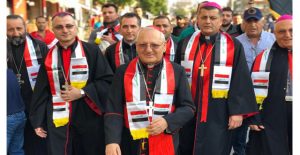Clerics support Iraqis’ anti-government protests
by Madeleine Davies
08 November 2019
AddThis Sharing Buttons
Share to Facebook
Share to TwitterShare to Skriv utShare to E-postShare to Mer…
PA Protesters demonstrate in Tahrir Square, Baghdad, on Friday of last week
CHURCH leaders in Iraq have expressed sympathy with protesters’ demands, amid a crackdown in which hundreds have been killed.
But there are also reports that the violence may spur further emigration.
Since the start of October, more than 250 Iraqis have died in protests against unemployment, corruption, and poor public services, calling for radical political reform (News, 11 October). Last Friday’s gathering in Baghdad is believed to be the biggest day of mass anti-government demonstrations since the fall of Saddam Hussein, in 2003. Most demonstrations have taken place in Shia-majority cities, and, on Monday, it was reported that live fire had been used against protesters in Kerbala, causing hundreds of injuries and 18 deaths. Last week, UN human-rights experts said that it was “incomprehensible — and heart-breaking — that such a brutal response can be levelled against Iraqis simply wanting to express their rights to freedom of speech and peaceful assembly”. The Chaldean Patriarch of Babylon and Archbishop of Baghdad, the Most Revd Louis Raphaël Sako, after visiting wounded protesters in a hospital in Baghdad, told Aid to the Church in Need: “We appeal to the conscience of Iraqi officials to listen seriously to their people, who are complaining of the current miserable situation, the deterioration of services, and the spread of corruption. . . “This is the first time since 2003 that the Iraqi people are expressing their peacefulness away from politicisation, breaking sectarian barriers and emphasising their Iraqi national identity.” Writing in The New York Times this week, Mina Al-Oraibi, the editor-in-chief of The National, a newspaper based in Abu Dhabi, blamed “the political system imposed on Iraq by the United States-led alliance in 2003, which fostered the lie that Iraqis did not have a unifying national identity and that their overriding identity was sectarian or ethnic.” The slogan that had resonated most was “We want a homeland.” Advertisement Last week, a group of Christian activists launched a campaign of solidarity, with the slogan: “We are Christians of the Nineveh Plains, in solidarity with our fellow protests. We apologize for not being able to demonstrate because in our cities we are not allowed to demonstrate.” But other Christian leaders have expressed concern about the protests. The Syriac Catholic Archbishop Yohanna Petros Mouche of Mosul told ACN: “It is just and appropriate that the oppressed and others deprived of their rights demonstrate — provided that they will be listened to and respected. “This is not the case in Iraq. There is no government, no respect for the human person, and people may use these circumstances to take revenge on others. Moreover, on the Nineveh Plains, we have had enough.” Jamal Liddawi, a partner of Release International who is providing aid to refugees in Erbil, Kurdistan, said that the protests, and the Turkish invasion of Syria (News, 18 October), could drive more Christians out of the country: “They have lost the desire to rebuild again.” This year’s Persecuted and Forgotten report from ACN suggests, however, that, while the number of Christians in Iraq may have fallen as low as 120,000, Christians are slowly returning to the Nineveh Plains. This week, the President of Caritas Iraq, Bishop Shelmon Warduni, told Vatican Radio that Iraqis were demanding that their rights be respected by “a government that exploits its own people”. “How is it possible for Iraq to be so rich — so rich — but the people are still forced to cry out for work?” he asked. “Where is Iraq’s money? Where are the riches of Iraq?”

